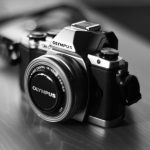SLR (single-lens reflex) digital cameras offer advanced features and capabilities that make them ideal for aspiring and seasoned photographers alike. Whether you're a beginner looking to upgrade from a point-and-shoot camera or an enthusiast seeking to expand your creative horizons, understanding the key considerations when choosing an SLR digital camera is crucial.
When selecting an SLR digital camera, there are several factors to keep in mind. The first is the sensor size. The sensor is the heart of the camera and determines the image quality and sensitivity to light. Larger sensors generally produce images with better dynamic range, lower noise, and higher resolution.
Another important factor to consider is the lens. SLR cameras allow you to interchange lenses, giving you the flexibility to adapt to different shooting situations. Common lens types include wide-angle, telephoto, and zoom lenses. The choice of lens depends on your specific photography needs.
The build quality of the camera is also crucial. SLR cameras are designed to withstand heavy use, but some models are more robust than others. Consider the materials used in the construction and the presence of weather-sealing features if you plan on shooting in harsh conditions.
The autofocus system plays a significant role in capturing sharp images. SLR cameras offer various autofocus modes, each with its strengths and weaknesses. Some cameras feature fast and accurate continuous autofocus, which is essential for capturing moving subjects.
The number of megapixels in the camera's sensor is often used as a measure of image quality. While megapixels are important, they are not the sole determinant of image quality. Other factors such as sensor size, lens quality, and image processing algorithms also contribute significantly.
The camera's shutter speed and aperture control are key factors in controlling the exposure of your images. A faster shutter speed freezes motion, while a wider aperture creates a shallower depth of field. Understanding the relationship between shutter speed, aperture, and ISO (the camera's sensitivity to light) is essential for capturing well-exposed images.
Finally, consider the ergonomics of the camera. SLR cameras come in various sizes and shapes. Choose a camera that feels comfortable in your hands and allows you to access the controls easily.
Choosing an SLR digital camera can be a daunting task, but by considering these factors carefully, you can find the perfect camera to meet your needs. Whether you're just starting out or looking to enhance your photography skills, an SLR digital camera offers endless possibilities for capturing stunning images.

